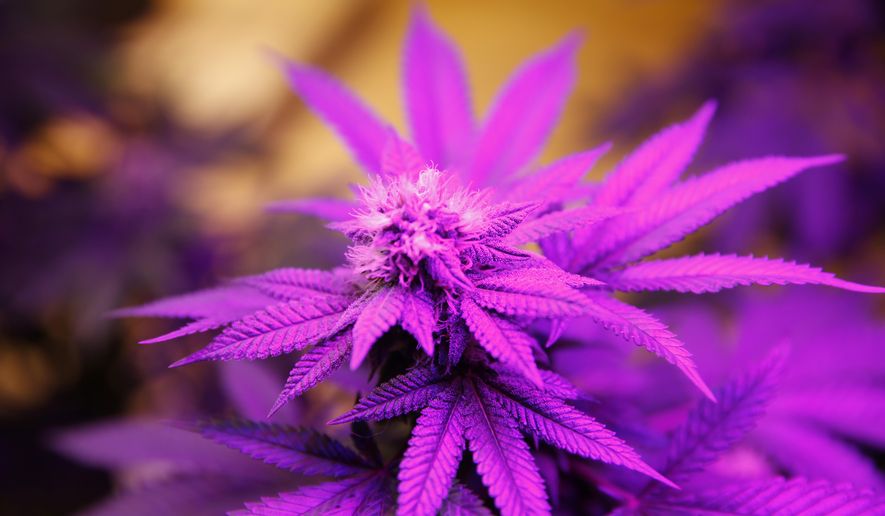Marijuana will be legal to smoke privately but not to be bought or sold in the District starting Thursday, despite Congressional efforts to block a voter-approved measure that allows recreational use of the drug.
The city’s mayor and police chief, touting the motto “home grow, home use,” on Tuesday offered additional guidance for how the city will move forward with implementation of the new laws, which allow for home cultivation and possession of small amounts of marijuana but not sale of the drug.
To help curb the potential for a free-for-all environment due to the lack of a legal way to buy marijuana in the city, D.C. Mayor Muriel Bowser said she will seek to restrict the operation of so-called “cannabis clubs” — private organizations that would facilitate the open exchange of marijuana through memberships.
The restriction would put the kibosh on pot entrepreneurs who have discussed the possibility of opening such clubs in the District, a practice popular in Spain, to skirt what are widely viewed as incomplete marijuana regulations.
“Existing law prevents the consumption of marijuana in any public space or anywhere that the public is invited, and that includes restaurants, bars and coffee shops,” Ms. Bowser said. “We believe that we’ll need to clarify that also includes private clubs — private clubs that don’t charge a daily admittance but may have membership fee. We’ll need to clarify that membership cannot include marijuana.”
Addressing D.C. Council members Tuesday, Ms. Bowser said she plans to submit emergency legislation to provide the clarification and asked members for a quick approval.
SEE ALSO: D.C. Council skirts federal threat, holds forum on marijuana
Initiative 71, a ballot measure approved by voters in November, is set to take effect at 12:01 a.m. Thursday at the conclusion of a congressional review period required of all D.C. laws.
The District is following Alaska, Colorado and Washington to become the fourth jurisdiction to legalize the recreational use of marijuana. Nearly 30 states and the district already have legalized the distribution of medicinal marijuana.
While some Republicans on Capitol Hill have taken the legal stance that federal legislation enacted in December blocks Initiative 71 from taking effect, D.C. lawmakers believe nothing will prevent it from becoming law.
“I don’t know what the Congress will do, but I do know what my job is at this point, and that’s to make sure that we have clear rules and guidelines for the people of the District of Columbia and the agencies of our government,” Ms. Bowser said.
It remains to be seen whether the matter will be challenged in court.
Initiative 71 will make it legal for people 21 and older to possess up to two ounces of marijuana for recreational use, grow up to six marijuana plants inside a D.C. residence, and to transfer up to an ounce of marijuana to others. Regulation of the sale of marijuana is a task left up to city lawmakers, who have thus far been unable to enact any legislation due to the prohibitions enacted by Congress.
SEE ALSO: Colorado marijuana law faces RICO lawsuit
D.C. Police Chief Cathy L. Lanier said police officers are being trained to handle a variety of potential scenarios involving marijuana, but added the department will take a hard line against both public smoking of marijuana and driving while under the influence.
“It’s not as complicated as it seems,” Chief Lanier said.
The patchwork of federal and District-owned property in the city, including public-housing complexes, does create a tricky scenario for those looking to stay on the right side of the law. Possession or use of marijuana on federal property remains an arrestable offense. Federal law enforcement agencies are not required to recognize the District’s legalization and could still make arrests for possession of any quantity of marijuana, Chief Lanier said. Possession or use in public housing complexes would likely put tenants at risk of eviction or arrest, noted D.C. Council member Yvette Alexander, Ward 7 Democrat.
In private apartment complexes or under other rental agreements, landlords could enforce nonsmoking policies, officials said.
Adam Eidinger, head of the D.C. Cannabis Campaign that got Initiative 71 on the ballot, said that if D.C. officials wanted to provide a safe space for residents to use marijuana they should endorse the cannabis club concept rather pursue additional regulations to ban it.
“There is a public interest is allowing people to go and use marijuana in a social setting,” he said, noting that parents may not want to use marijuana around their children at home.
Without a setting to use marijuana other than in a private home, Mr. Eidinger believes people will just use marijuana discreetly in public.
“I think if you did give people a place to go, they would go there,” he said.
• Andrea Noble can be reached at anoble@washingtontimes.com.




Please read our comment policy before commenting.